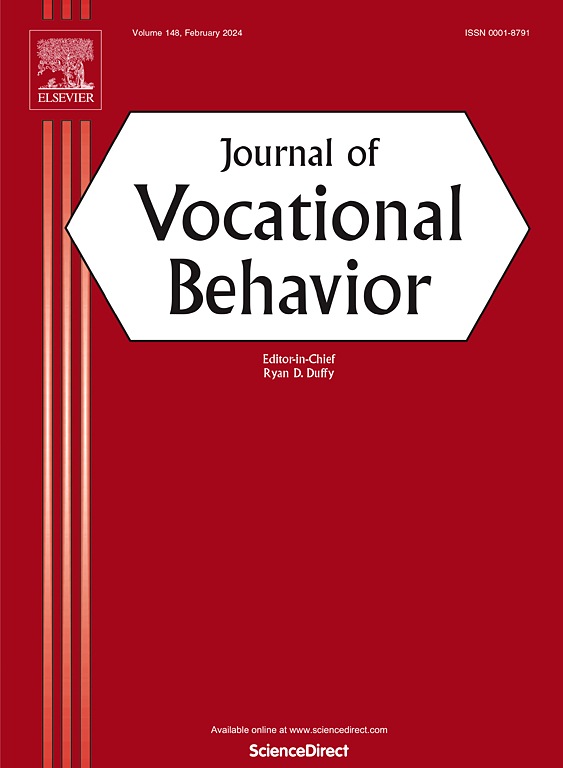Employability as antecedent of eudaimonic wellbeing at work: The mediating role of work meaningfulness
IF 5.2
1区 心理学
Q1 PSYCHOLOGY, APPLIED
引用次数: 0
Abstract
Employee eudaimonic wellbeing is crucial for sustainable performance, health, and quality of work life. However, research is needed to understand what shapes eudaimonic wellbeing at work (EWW), and how and why. Drawing on the self-discovery framework of eudaimonic identity, this study investigated whether employability dimensions (career identity, personal adaptability, and social and human capital) are related to two dimensions of EWW (personal growth at work and purpose in career). Moreover, based on the worker-centric approach to work meaningfulness, we tested whether these relationships are mediated by work meaningfulness. Our study sample consisted of 263 employees. We implemented a longitudinal design with three data collection points. Path analysis results showed that career identity was positively and directly related to both dimensions of wellbeing, whereas social capital and human capital were positively and indirectly related to them via work meaningfulness. Personal adaptability was neither directly nor indirectly related to eudaimonic wellbeing. Our findings advance the theory on antecedents of EEW and its integration with vocational psychology by clarifying how and why employability influences eudaimonic wellbeing at work. The study highlights the importance of employees' employability, specifically career identity, social capital, and human capital, in fostering EWW.
就业能力作为工作幸福感的先决条件:工作意义的中介作用
员工的幸福感对可持续绩效、健康和工作生活质量至关重要。然而,需要研究来了解是什么塑造了工作中的幸福感,以及如何以及为什么。本研究利用理想同一性的自我发现框架,考察了就业能力维度(职业认同、个人适应性、社会资本和人力资本)与EWW(工作中的个人成长和职业目的)的两个维度是否相关。此外,基于以员工为中心的工作意义取向,我们检验了这些关系是否受到工作意义的中介作用。我们的研究样本包括263名员工。我们实施了纵向设计,有三个数据收集点。通径分析结果显示,职业认同与幸福感的两个维度存在直接正向关系,而社会资本和人力资本通过工作意义与幸福感的两个维度存在间接正向关系。个人适应能力与幸福既没有直接关系,也没有间接关系。我们的研究结果通过阐明就业能力如何以及为什么影响工作中的幸福感,推进了电子商务认知的前因理论及其与职业心理学的整合。该研究强调了员工的就业能力,特别是职业认同、社会资本和人力资本在培养EWW中的重要性。
本文章由计算机程序翻译,如有差异,请以英文原文为准。
求助全文
约1分钟内获得全文
求助全文
来源期刊

Journal of Vocational Behavior
PSYCHOLOGY, APPLIED-
CiteScore
13.10
自引率
5.40%
发文量
85
期刊介绍:
The Journal of Vocational Behavior publishes original empirical and theoretical articles offering unique insights into the realms of career choice, career development, and work adjustment across the lifespan. These contributions are not only valuable for academic exploration but also find applications in counseling and career development programs across diverse sectors such as colleges, universities, business, industry, government, and the military.
The primary focus of the journal centers on individual decision-making regarding work and careers, prioritizing investigations into personal career choices rather than organizational or employer-level variables. Example topics encompass a broad range, from initial career choices (e.g., choice of major, initial work or organization selection, organizational attraction) to the development of a career, work transitions, work-family management, and attitudes within the workplace (such as work commitment, multiple role management, and turnover).
 求助内容:
求助内容: 应助结果提醒方式:
应助结果提醒方式:


